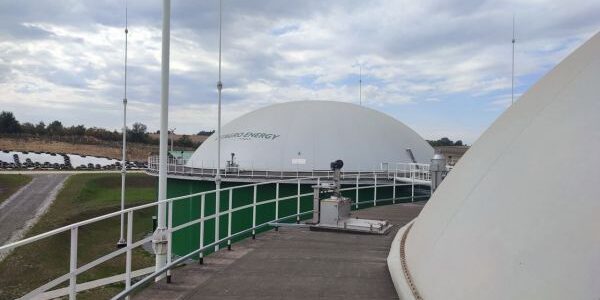
The Vitagro group of companies, which already has one biomethane plant with an annual capacity of 3 million cubic meters in the Khmelnytskyi region, intends to build two or three more such plants in a year and a half, each costing EUR6-6.5 million, according to the company’s director of development and investment, Serhii Savchuk.
“We plan to build two or three more plants with a capacity of 3 million cubic meters each. We estimate the cost of one plant at EUR 6-6.5 million. We will need about 1.5 years to do this,” Savchuk said in a comment to EnergoReform on the sidelines of the Solar Agro Conference organized by the Solar Energy Association of Ukraine.
He did not specify the details of biomethane exports from the first plant, noting that after a test delivery in February, “everything the plant produces is sold to a number of countries, including Germany and the UK, at market prices.”
During his speech at the conference, he suggested that the company may work with Ukrainian banks to expand its biomethane capacity.
“Today, our plant with a capacity of 3 million cubic meters of biomethane, which is produced from manure from our livestock complexes, is fully operational. We will build a pipeline, Ukrgasbank is here, you can pay attention to us,” he said to conference participant Mykola Alferov, deputy director of the SME Department at UGB.
Savchuk also noted that during the war, the group launched a bioethanol plant in the Ternopil region by reconstructing an alcohol plant it privatized at the end of 2022, which cost EUR20 million.
“We invested EUR 20 million, completely re-equipped the distillery, and now have 25,000 tons of bioethanol for export from the processing of 85,000 tons of corn,” explained the director of development and investment at Vitagro.
In a comment to Energorforma, Savchuk expressed hope that cooperation will eventually be established for the sale of bioethanol to fuel companies in Ukraine, which from May 1 must sell gasoline containing at least 5% of this substance, but do not mix the product here, instead importing it ready-made from Europe.
He also shared his experience of installing SES groups on farms for their own consumption, which he called “an absolutely effective investment.”
“Seven solar stations for our own consumption were installed in a few months, and we have developed an appetite for a second phase, so we want to launch separate complexes both on the roof and on the side. This is economics, this is ecology, this is the ESG (Environmental, Social, and Governance) trend, which is very relevant. We are a good example for the development of SES for our own consumption, and in the future there will be energy storage,” Savchuk said about Vitagro’s plans.
As reported in February 2025, Vitagro announced its intention to reach the planned annual capacity of the biomethane plant of 3 million cubic meters in 2025 and, if exports are successful, to build two more plants (in the Khmelnytskyi and Rivne regions) to increase production and exports.
At that time, it was indicated that the group of companies was considering the option of attracting foreign investors to its capital.
The company expected that the EUR6 million invested in the construction of the first biomethane plant in the Khmelnytskyi region would pay off in five years, but if the market continued to grow, it would pay off sooner. The company’s cost price for biomethane was stated at over EUR 500 per 1,000 cubic meters.
In February, the chairman of the board of the Bioenergy Association of Ukraine, Georgy Geletukha, noted that the average price of biomethane for export to Europe could be approximately EUR 900 per thousand cubic meters.
Agroholding Vitagro exported its first batch of biomethane in 67,000 cubic meters (destination country – Germany) on February 6, 2025.
The Vitagro group of companies is engaged in the production and processing of agricultural crops, in particular fruits and vegetables, dairy farming, and pig breeding. The group cultivates about 85,000 hectares of land in the Khmelnytskyi, Ternopil, and Rivne regions. In 2022, it acquired the Marylivsky Distillery (Nagirnyanka village, Ternopil region) from Ukrspirt.
According to the Unified State Register of Legal Entities and Individual Entrepreneurs, the ultimate beneficiary of the investment company Vitagro is People’s Deputy Serhiy Labazuk (parliamentary faction “For the Future”).